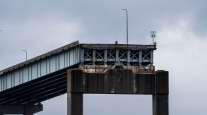Senior Reporter
Federal Lawmakers Unveil Bill to Repair Bridges

[Stay on top of transportation news: Get TTNews in your inbox.]
The Bridge Investment Act, a bill meant to provide $20 billion to fix the country’s structurally deficient bridges by establishing a grant program, was unveiled by a bipartisan group of House lawmakers.
Reps. Sean Patrick Maloney (D-N.Y.), Garret Graves (R-La.), Earl Blumenauer (D-Ore.) and Darin LaHood (R-Ill.) sponsored the bill, which also would streamline the regulatory process and establish a standardized evaluation process.
“Repairing our failing infrastructure has been a priority of mine since day one, and I’m proud to continue that commitment by working across the aisle to lead this strong, bipartisan bill. Together, we will reinvest billions into repairing bridges and create good-paying, meaningful jobs across America,” Maloney said last month.

Maloney
“We’ve seen the tragic consequences of underfunding bridge maintenance in places like Atlanta and Minneapolis in recent years. There is a big difference between a crack on a road and a crack on a bridge. There must be special attention to bridges as their failure can compromise entire regional transportation systems. With two-thirds of the continental United States’ water draining into the Mississippi River system, Louisiana has the highest number of bridge crossings per mile in the nation,” added Graves.
A version of the House’s bill is included in highway policy legislation a Senate committee advanced last year. Neither bill has been scheduled for floor debate. In the House, transportation policy authorizers are expected to advance comprehensive highway legislation prior to the expiration of a 2015 highway law in September.

Graves
In the Senate, Environment and Public Works Committee Chairman John Barrasso (R-Wyo.) noted his highway reauthorization America’s Transportation Infrastructure Act had advanced out of his panel by a 21-0 vote. However, committees with jurisdiction over highway funding, commercial transportation and transit systems have yet to approve key provisions that would be included in the legislation.
“The Senate is ready to answer the president’s call,” Barrasso said Feb. 5. “America’s Transportation Infrastructure Act is the most substantial highway infrastructure legislation in history.”
“It will help fix our roads, help speed up project delivery, help protect the environment and help grow America’s economy,” the senator added.
The previous day, during his State of the Union address, President Donald Trump called on Congress to advance Barrasso’s bill. In the White House’s fiscal 2021 budget request unveiled Feb. 10, an infrastructure policy component proposed $35 billion for a bridge rehabilitation program. According to the administration’s proposal, “This program will make targeted investments in critical bridge infrastructure to restore them to good condition.”
In part two of a two-part exploration of autonomous technology today, our latest RoadSigns podcast revisits conversations with Chuck Price of TuSimple and Ognen Stojanovski of Pronto.ai. Hear them discuss a palatable Level 2 version of trucking autonomy. Listen to a snippet above, and to hear the full episode, go to RoadSigns.TTNews.com.
A recent analysis by the American Road and Transportation Builders Association, an infrastructure funding proponent, determined 47,052 out of the nation’s 616,087 bridges are considered structurally deficient. “If the 47,052 structurally deficient bridges in the U.S. were placed end-to-end, they would stretch nearly 1,100 miles—the distance between Chicago and Houston. Cars, trucks and school buses cross these compromised structures 178 million times every day,” said David Bauer, ARTBA’s chief executive. “The Bridge Investment Act is a thoughtful approach to authorize federal investment to improve the safety and performance of bridges in need of repair across the country.”
“Many of the nation’s bridges were built decades ago and are approaching or have reached the end of their design life. Our bridges, on which we travel for work, vacations, taking our children to school, and more need adequate funding to keep us safe,” added Kancheepuram “Guna” N. Gunalan, president of the American Society of Civil Engineers.
In 2017, ASCE issued a C+ grade for the country’s bridges. The country’s overall infrastructure was issued a D+ grade.
Want more news? Listen to today's daily briefing:





